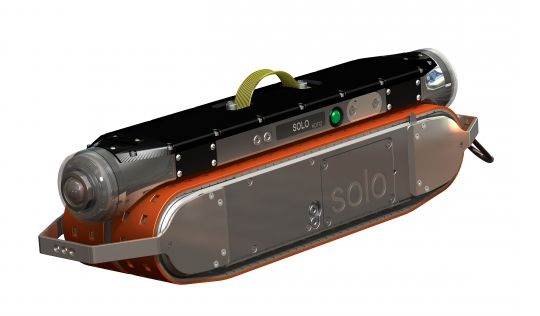Robots have been to Mars, the moon and the ocean floor, but until last month they’d never visited Pittsburgh’s sewer pipes.
That changed on June 22nd, when a squat inspector called The Solo began its subterranean journey under the city’s Beechview and Brookline neighborhoods. The Solo, which looks like it could be R2-D2’s accessory dog, is an invention of RedZone Robotics, and while its journey may only represent one small step for robots, it’s one giant leap for the field of unmanned pipe condition assessment.
The Solo came to Pittsburgh courtesy of a partnership between the Pittsburgh Water and Sewer Authority (PWSA) and RedZone, which is based in the city. As an agency release explained, PWSA has to inspect its sewers per an agreement with the Pennsylvania Department of Environmental Protection. Previously, PWSA has met its end of the agreement with a cabled truck and operator. The cable attaches to a camera, which allows crews to inspect pipes for fissures and leaks.
“The PWSA was averaging approximately 80,000 linear feet in four months using traditional televising methods,” the release states. “RedZone will complete the same amount of work in 6-8 weeks.”
According to Brendan Schubert, the agency’s manager of external affairs, the robot is also cheaper than traditional methods, costing about $1.50 per linear foot. That’s because The Solo is autonomous.
“It can be launched and then proceed to do the inspection on its own without any interaction from any human being,” explains John DePasquale, of RedZone.
The robot can also traverse smaller-diameter pipes, Schubert says, accessing portions of the city’s sewers that were previously unavailable.
“The sewers that we’re exploring now are a little smaller,” he says. “This is the first time we’re able to explore them.”

Solo Robot (Credit: RedZone Robotics)
Pittsburgh isn’t the only city to partner with RedZone, which states a mission of helping “people, cities and the environment by giving wastewater managers the information and tools they need to make fact-based decisions on how to spend limited funds.” Others have included DeKalb, Illinois, Garden City, Georgia and Peachtree, Georgia. But DePasquale adds that many cities still don’t engage in the kinds of inspections that The Solo, or even camera-on-a-chord methods, enable. Instead, he says that they focus on cleaning their pipe systems, which can actually be counterproductive.
“When you clean out the pipe, you wash away the evidence of where you’re having issues,” he says, pointing to joint separation, cracks and root balls. For such issues, the dirt and residue that get washed away during a cleaning could actually be telltale signs of a problem.
“We believe ‘Inspect First,’” he says. “It’s like when you go to the doctor saying ‘I have a pain in my side,’ and they send you in for an MRI or x-ray.”
The organization is only one of several looking underground for accurate data. Sewage is a kind of smelly next frontier for researchers trying to collect numbers on everything from drug use to health. Because self-reported surveys are notoriously unreliable, a bourgeoning field of “sewer epidemiologists” has taken to measuring and assessing samples of flushed waste. Sewage can reveal information about a city’s disease patterns, medication use and even obesity trends.
Not surprisingly, new fields like sewer epidemiology are wrestling with ethical questions about privacy, particularly when researchers assess small data sets. But sewage analytics are different than sewage system analytics. The Solo and its info-collecting ilk look at the infrastructure itself, not the more personal substances flowing through it.
“This data is provided and purchased, technically, from the owners themselves,” DePasquale says, referring to the publicly owned and maintained pipes.
In Pittsburgh, The Solo will examine a relatively small 17-mile chunk of the city’s total pipe network. But Schubert adds that this collaboration could lead to others in the future.
“We’re keeping an open dialogue and working through this project, and then we’ll see how our relationship can mature,” he says, adding that the project fits in with authority-wide goals of “creating a more performance- and efficiency-based culture.”
As for the robots, they can check Pittsburgh’s small-diameter sewer pipes off their collective bucket list — right next to Mars and the ocean floor.
The Works is made possible with the support of the Surdna Foundation.

Rachel Dovey is an award-winning freelance writer and former USC Annenberg fellow living at the northern tip of California’s Bay Area. She writes about infrastructure, water and climate change and has been published by Bust, Wired, Paste, SF Weekly, the East Bay Express and the North Bay Bohemian
Follow Rachel .(JavaScript must be enabled to view this email address)










